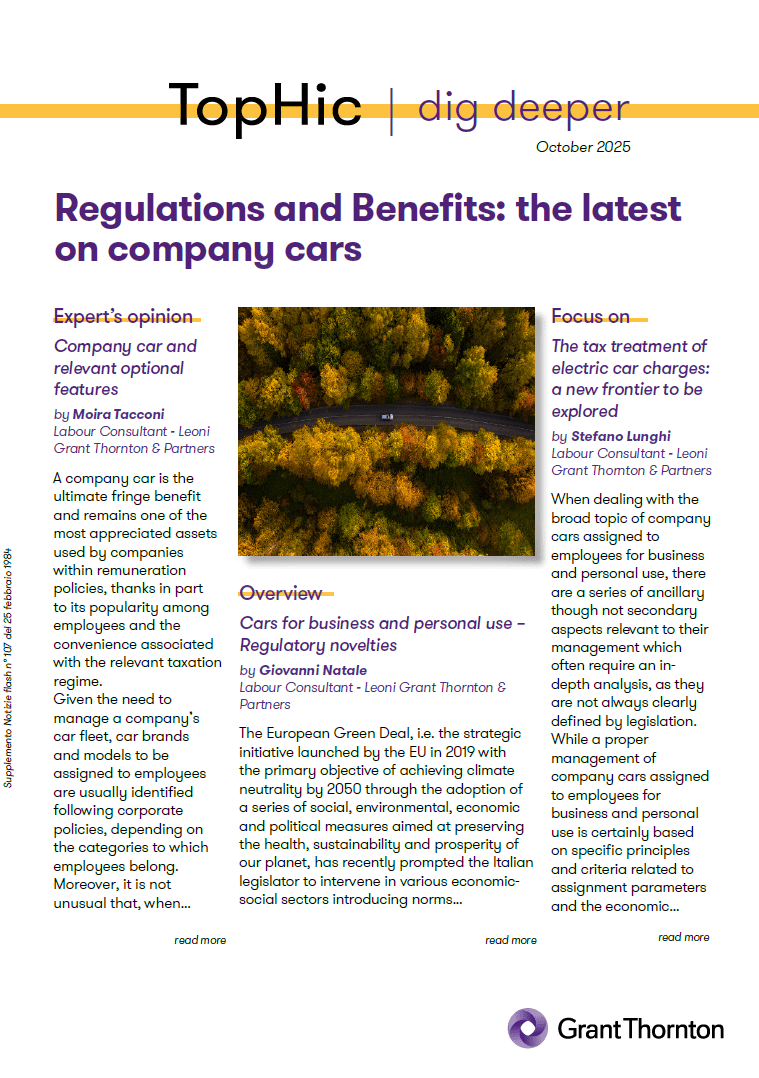
When dealing with the broad topic of company cars assigned to employees for business and personal use, there are a series of ancillary though not secondary aspects relevant to their management which often require an in-depth analysis, as they are not always clearly defined by legislation.
While a proper management of company cars assigned to employees for business and personal use is certainly based on specific principles and criteria related to assignment parameters and the economic value of the benefit, it is equally true and increasingly common to find aspects related to factors complementary to the asset, such as, for example, the management of fuel and electric recharging and the facilitation of the installation of electric charging stations at the homes of employees, for which there are no specific regulations in place.
In such an increasingly complex and everchanging scenario, some interesting replies to application for rulings were published by the Revenue Office over the last few years, tackling issues such as the right to benefit from a series of services strictly related to the granted car, upon specific conditions set by companies.
In 2022, with its response no. 329, the Revenue Office expressed its opinion on the provision of electric car charging services to employees, in relation to the case of a company that had made ecological sustainability a strategic lever for its development, raising awareness among its employees about the use electric mobility, even in their private lives, renewing its company car fleet with electric or hybrid vehicles and also encouraging the use of these types of vehicles in the employees’ private life.
In this context, the employer’s intention, set out in a collective agreement covering the entire workforce, were to grant a six-month period of free charging, entirely at the company's expense, to employees who purchased electric cars for personal use within a certain period of time, using, where possible, electricity produced by the company's photovoltaic or hydroelectric plants or, alternatively, by entering into agreements with third-party charging providers, establishing precise and specific limitations in advance, such as a maximum number of charges, in order to prevent abuse.
In accepting the solution proposed by the applicant, the Revenue Office considered in their response that such specific benefit (free charging of private cars for a given and limited period of time as set out in a collective company agreement) could benefit from the provision on non-competition in the formation of employment income, as per art. 51, para. 2, letter f) of the TUIR (Consolidated Income Tax Law), as the opportunity to use electric mobility was granted by the employer in order to promote a conscious use of resources and responsible attitudes towards the environment among its employees. In fact, according to the Revenue Office's position, a goal of environmental education pursued by the company can be identified in this initiative.
With its subsequent response no. 421/2023, the Revenue Office instead expressed its opinion on the tax treatment of sums paid by employers to employees as reimbursements for electric vehicle charging carried out at home, as well as on the installation and maintenance of devices for charging electric and plug-in hybrid vehicles at home.
In the case at stake, the Revenue Office reinstated that the sums paid by the employer to an employee as expense refund are considered as employment income for the latter, except for the expenses reimbursed in the exclusive interest of the employer, advanced by the employee for operational efficiency and subject to specific exceptions provided for in art. 51, para. 5 of TUIR for the analytical reimbursement of travel expenses. In line with the above, the response at stake considered that both the refunds paid by the employer to its employees for the electricity costs incurred by the latter to recharge company vehicles assigned for business and personal use, and the costs of installing and maintaining devices for recharging electric and plug-in hybrid cars at home, if recognised by the company to the employees, constitute employment income subject to taxation (unless the total annual exemption allowance provided for the transfer of goods in kind under art. 51, para. 3 of TUIR is exceeded).
Finally, in response no. 237/2025, the Revenue Office expressed its opinion on the management of recharging at public charging stations for electric or hybrid company cars granted for business and personal use to employees.
The ruling concerned a company willing to integrate its car fleet, consisting exclusively of combustion vehicles, with new electric and plug-in hybrid cars, granting employees who opted for a replacement electric car a certain number of electric recharges within a specific limit and using a dedicated company card.
The applicant also provided that each employee was required to report and periodically communicate the kilometres travelled for business purposes, so as to identify, by difference, the remaining kilometres travelled for private reasons.
In this case, the Revenue Office made an interesting concession excluding recharges paid with company cards from taxable employment income for the total amount included in the conventional ACI value already subject to full taxation - even with regard to kilometres travelled for personal use - within the distance limit established and predefined by company regulations. Therefore, in this specific case, companies could adopt a policy providing for the employer bearing the costs incurred for electric recharges, carried out within the limits of the conventional ACI values and following an objective and demonstrable tracking of work-related travel only, in order to determine and record, by difference, the personal use reimbursable under the tax exemption regime.
In conclusion, the management of company electric car fleets deserves to be examined on a case-by-case basis in order to avoid potential critical issues - also in the light of the lack of consistency in praxis - but it also represents an interesting opportunity for companies to consider when defining their remuneration policies.
